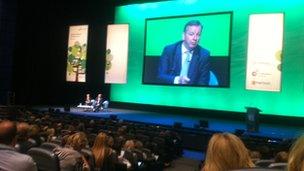More teachers to learn in classroom - Michael Gove
- Published

Michael Gove wants more teachers to be trained by the schools that recruit them
More teachers in England are to be trained "on the job" rather than in universities, under plans set out by the Education Secretary Michael Gove.
About half of new teachers could be trained in schools, he said.
At a conference in Birmingham, Mr Gove also announced extra cash to attract top graduates to teach in challenging schools or maths in primary schools.
And he announced a further expansion of the Teach First programme, which places high-achieving graduates in schools.
This will lead to a trebling of the places it had in 2010, bringing the total to 1500.
'Revolutionary' changes
Mr Gove told the annual conference of the National College for School Leadership he wanted more schools - and groups of schools and academies - to work with universities to train teachers while they worked.
"The impact of these changes on initial teacher training will be revolutionary," he said. "By the end of this parliament, well over half of all training places will be delivered by schools.
"The idea is a simple one: take the very best schools, ones that are already working to improve other schools, and put them in charge of teacher training and professional development for the whole system."
Already, about 7,000 new graduates are being trained in schools out of a total of 30,000 graduate places in England. The government wants that figure to rise to 10,000.
On top of that, there will be another 5,000 recruits to teaching from people changing careers.
University-based graduate trainee teachers generally study for one year, although as much as two-thirds of their time is spent on placements in schools.
With school-based training, trainees are given a mentor to help them learn as they teach. They are also sent on short courses.
Such schemes have proved popular with people opting to switch to teaching mid-career, not least because trainees are paid a salary.
The National Union of Teachers said that trainee teachers needed practical training but also "the time and space to develop and exchange ideas on best practice in education".
Critics fear the move towards more school-based learning will see a loss of expertise in teacher training from universities and the scrapping of courses. It is thought about 300 courses could be closed or merged in the next year.
Government officials say schools will be linking up with universities and commissioning training from them, so the sector will not wither.
Extra cash
Under the plans set out by Mr Gove, people who train to teach in some of the country's most challenging schools are to get up to £5,000 extra.
Last June, ministers announced new bursaries of between £4,000 and £20,000 to attract top graduates for subjects where there was a teacher shortage, such as physics, maths, chemistry and languages.
Now graduates who do most of their training in a school with many children on free school meals will receive up to 25% extra in bursary payments, up to £5,000.
And graduates who want to train to be specialist primary school maths teachers will be able to get an extra £2,000 on top of other bursaries they might be entitled to.
The government also announced last year that it would only fund the training of teachers with at least a second-class degree.
Mr Gove's speech to heads and aspiring heads also included rich praise for the achievements of London's schools.
He said there had been a "transformation" since 2004, with the capital now out-performing the rest of England as a whole in terms of GCSEs.
- Published13 March 2012
- Published27 June 2011
- Published8 February 2012
- Published24 November 2010
- Published11 January 2011
- Published1 May 2012
- Published6 October 2011
- Published26 June 2011
- Published2 September 2011
- Published19 December 2011